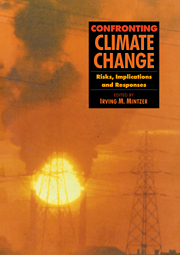Book contents
- Frontmatter
- Contents
- Foreword
- Acknowledgements
- List of Reviewers
- 1 Living in a Warming World
- I The Science of Climate Change
- II Impacts of Global Climate Change
- 7 Future Sea Level Rise: Environmental and Socio-Political Considerations
- 8 Effects of Climate Change on Food Production
- 9 Effects of Climate Change on Shared Fresh Water Resources
- 10 Effects of Climate Change on Weather-Related Disasters
- 11 The Effect of Changing Climate on Population
- III Energy Use and Technology
- IV Economics and the Role of Institutions
- V Equity Considerations and Future Negotiations
- Annex I
- Annex II
- Glossary
- Index
9 - Effects of Climate Change on Shared Fresh Water Resources
Published online by Cambridge University Press: 06 January 2010
- Frontmatter
- Contents
- Foreword
- Acknowledgements
- List of Reviewers
- 1 Living in a Warming World
- I The Science of Climate Change
- II Impacts of Global Climate Change
- 7 Future Sea Level Rise: Environmental and Socio-Political Considerations
- 8 Effects of Climate Change on Food Production
- 9 Effects of Climate Change on Shared Fresh Water Resources
- 10 Effects of Climate Change on Weather-Related Disasters
- 11 The Effect of Changing Climate on Population
- III Energy Use and Technology
- IV Economics and the Role of Institutions
- V Equity Considerations and Future Negotiations
- Annex I
- Annex II
- Glossary
- Index
Summary
Editor's Introduction
Climate change will not only affect the level and location of the seas. It will also alter the timing, extent, and distribution of precipitation and runoff—the renewable sources of fresh water on which human societies and natural ecosystems depend. Peter Gleick analyses the implications of general circulation modelling experiments for rainfall, soil moisture, and streamflows, and notes that the potential impacts in some regions may be severe. Growing populations may add more demand for this water. These effects may be particularly important where two or more nations depend heavily on shared rivers or lakes. Where water resources are already tightly stretched, fresh water availability could become a military security concern.
Will nations go to war over water? Probably not, but in some river valleys — including the Jordan/Litani and the Tigris/Euphrates systems — heightened tensions over disrupted or shrinking water supplies, exacerbated by climate change, can only add to what is already a highly volatile mix of political tensions. As Gleick points out, we have seen early evidence of “water warfare” in the last several years. Water supplies may become strategic targets; control over access to shared water resources may be used as an economic and political weapon. Conflicts over water rights may become a brake on development for some struggling nations. Even if climate change does not take place, concerns over shared water resources will probably become an increasingly important part of international relations in the future.
- Type
- Chapter
- Information
- Confronting Climate ChangeRisks, Implications and Responses, pp. 127 - 140Publisher: Cambridge University PressPrint publication year: 1992
- 13
- Cited by

